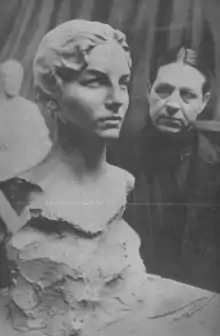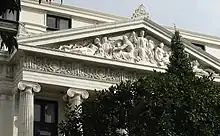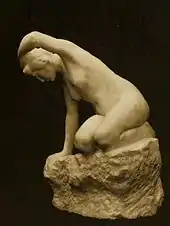Haig Patigian
Haig Patigian (Armenian: Հայկ Բադիկեան; January 22, 1876 – September 19, 1950), was an Armenian-American sculptor.


Biography
Patigian was born in the city of Van in the Ottoman Empire. His parents were teachers at the American Mission School in Armenia. He was largely self-taught as a sculptor. Patigian spent most of his career in San Francisco, California and most of his works are located in California. The Oakland Museum in Oakland, California, includes a large number of his works in its collection, and more can be seen in and around San Francisco City Hall.
Patigian was an active member of the Bohemian Club, serving two terms as club president. He designed the Owl Shrine, a 40-foot high hollow concrete and steel structure which was built in the 1920s to have the appearance of a natural rock outcropping which happened to resemble an owl.[1] The Owl Shrine became the centerpiece of the Cremation of Care ceremony at the Bohemian Grove in 1929.[2]
Patigian married Blanche Hollister of Courtland, California, in 1908.[3]
Selected public works


- McKinley statue in Arcata, California, 1906 (removed February 28, 2019)
- Electricity, Imagination, Invention and Steam; four repeated sculptures at the Machinery Palace, Panama-Pacific International Exposition (1915) (destroyed)[4]
- General John Pershing, San Francisco, California, 1921
- Statue of Abraham Lincoln, San Francisco, California, 1928
- Thomas Starr King (1931)
- This work resided in the Capitol Building in Washington D.C. as one of California's contributions to the National Statuary Hall Collection until being replaced by a statue of Ronald Reagan in 2009.
- Volunteer Firemen Memorial, San Francisco, California, 1933
Architectural sculpture
- M. H. de Young Memorial Museum, tympanum, San Francisco, California, circa 1895 (removed)
- San Francisco Savings Union Bank building, pediment, San Francisco, California, 1911
- Palace of Fine Art & the Machinery Palace, (now destroyed) Panama-Pacific Exposition, San Francisco, California, 1915
- Metropolitan Life Insurance Building, (now the Ritz Carlton Hotel) pediment, San Francisco, California, 1920
- Navigation, Aviation, and Industry, Richfield Tower, Los Angeles, California, allegorical figures, 1928
- when the building was demolished in 1968 the figures were moved to the Art Museum of the University of California, Santa Barbara
- Department of Commerce Building, pediment, Washington D.C., 1934
References
- Starr, Kevin (2002). The Dream Endures: California Enters the 1940s. Oxford University Press. ISBN 0-19-515797-4.
- Cross, Francis L. (1972). The Annals of the Bohemian Club for the years 1907-1972, Centennial Edition, volume V. San Francisco: Bohemian Club and Recorder-Sunset Press.
- Herringshaw, Thomas William. American Elite and Sociologist Bluebook, p. 387. American Blue Book Publishers, 1922.
- Todd, Frank Morton (1921). The Story of the Exposition (Volume Two of Five). New York, London: G. P. Putnam's Sons, The Knickerbocker Press.
- Kvaran, Einar Einarsson, Architectural Sculpture in America, unpublished manuscript
- National Sculpture Society, Contemporary American Sculpture 1929, National Sculpture Society, New York, NY 1929
- Opitz, Glenn B, Editor, Mantle Fielding’s Dictionary of American Painters, Sculptors & Engravers, Apollo Book, Poughkeepsie NY, 1986
- Proske, Beatrice Gilman, Brookgreen Gardens Sculpture, Brookgreen Gardens, South Carolina, 1968
External links
- Painted portrait of Haig Patigian with Bohemian Owl in background, by Peter Ilyin (1927). Online Archive of California.
- His work is everywhere in SF. But this secret society head is now largely forgotten., by Greg Keraghosian, San Francisco Chronicle, Octocer 3, 2023.